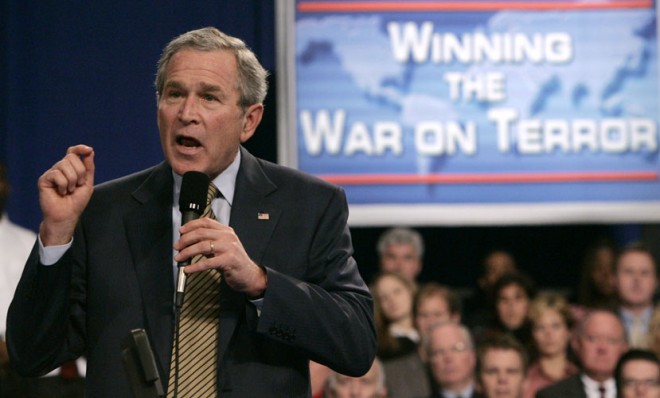Will the world believe the West's evidence of Syria's WMD use?
Skeptics haven't forgotten about George W. Bush's "evidence" of WMDs in Iraq


A free daily email with the biggest news stories of the day – and the best features from TheWeek.com
You are now subscribed
Your newsletter sign-up was successful
As Britain pushes the case at the United Nations for bombing Syria's military to protect civilians from chemical weapons attacks, the Obama administration is beginning to unveil its evidence that Syrian President Bashar al-Assad has been using poison gas against his own people.
Exhibit A is reportedly a phone call between two Syrian military commanders that was intercepted following an attack last week that killed hundreds of people behind rebel lines outside Damascus. The U.S. plans to unveil more information as soon as Thursday when it declassifies an intelligence report on how the attack was carried out.
Unsurprisingly, skeptics are drawing connections between the administration's justification for possible missile strikes against Syria and the faulty intelligence about Saddam Hussein's alleged stockpile of weapons of mass destruction, which was used to rally support for the 2003 invasion of Iraq.
The Week
Escape your echo chamber. Get the facts behind the news, plus analysis from multiple perspectives.

Sign up for The Week's Free Newsletters
From our morning news briefing to a weekly Good News Newsletter, get the best of The Week delivered directly to your inbox.
From our morning news briefing to a weekly Good News Newsletter, get the best of The Week delivered directly to your inbox.
Hans Blix, who was the U.N.'s chief weapons inspector in Iraq from 2000 to 2003, says the WMD issue is a "poor excuse" for a foreign military intervention in Syria. The U.S. and its allies, he says, are getting ahead of due process in Syria as surely as they did in Iraq.
"If the aim is to stop the breach of international law and to keep the lid on others with chemical weapons," Blix tells The Huffington Post, "military action without first waiting for the U.N. inspector report is not the way to go about it."
Blix isn't alone. Alan Reynolds at National Review says that the U.S. appears to be jumping the gun, especially since there have been suspicions that Syrian rebels have launched chemical attacks, too. If nothing else, Reynolds says, the parallels between the certainty expressed by the Bush and Obama administrations should serve as a reminder that it is far easier to rush into armed conflict than it is to get out. "The last WMD hysteria rationalized nearly nine years of war," Reynolds says. "One simple lesson of the Iraq War should not have to be relearned: Haste makes waste."
But there are key differences between Syria in 2013 and Iraq in 2003. As Jay Newton-Small at TIME says, "Obama, who ran on a platform in 2008 of ending Bush's wars in the Middle East, isn't Bush, and there are important distinctions between the two scenarios."
A free daily email with the biggest news stories of the day – and the best features from TheWeek.com
For one thing, Newton-Small says, Bush was selling a massive, open-ended invasion aimed at regime change, while Obama is merely trying to protect civilians by sending Assad the clear message that he will pay dearly for violating treaties banning the use of poison gas. And, she says, while Bush charged in over the objections of much of Europe — remember Freedom Fries? — and the entire Arab world except Kuwait, Obama has more support, including the possible participation of Saudi Arabia and Turkey.
And there is another, more compelling, argument for dismissing comparisons between Iraq and Syria. In Iraq, weapons inspectors questioned whether Saddam really had a WMD stockpile, or was trying to build one — directly contradicting much of the U.S. intelligence. "In the case of Syria, however, no country — not even Assad's allies — question that the regime has stockpiled massive amounts of chemical weapons," Michael Wilner points out at The Jerusalem Post.
So while the outcome of hitting Syria's military with a volley of missiles might be uncertain, one thing Obama and his allies don't have to worry about is the embarrassment of finding out that Assad didn't really have WMD after all.
Harold Maass is a contributing editor at The Week. He has been writing for The Week since the 2001 debut of the U.S. print edition and served as editor of TheWeek.com when it launched in 2008. Harold started his career as a newspaper reporter in South Florida and Haiti. He has previously worked for a variety of news outlets, including The Miami Herald, ABC News and Fox News, and for several years wrote a daily roundup of financial news for The Week and Yahoo Finance.
-
 6 exquisite homes with vast acreage
6 exquisite homes with vast acreageFeature Featuring an off-the-grid contemporary home in New Mexico and lakefront farmhouse in Massachusetts
-
 Film reviews: ‘Wuthering Heights,’ ‘Good Luck, Have Fun, Don’t Die,’ and ‘Sirat’
Film reviews: ‘Wuthering Heights,’ ‘Good Luck, Have Fun, Don’t Die,’ and ‘Sirat’Feature An inconvenient love torments a would-be couple, a gonzo time traveler seeks to save humanity from AI, and a father’s desperate search goes deeply sideways
-
 Political cartoons for February 16
Political cartoons for February 16Cartoons Monday’s political cartoons include President's Day, a valentine from the Epstein files, and more
